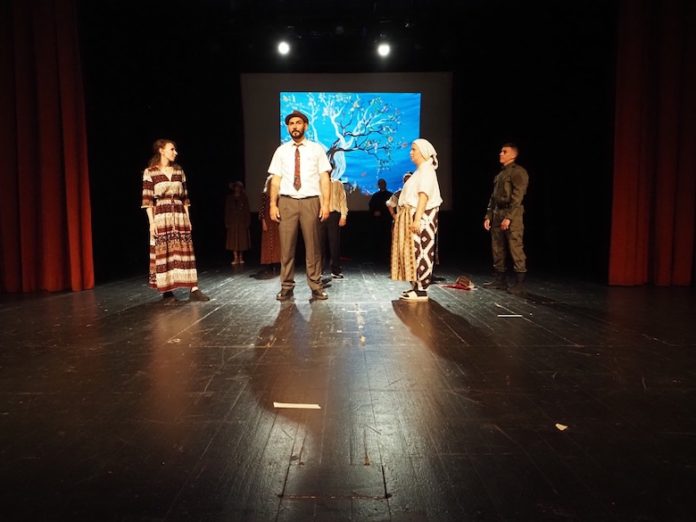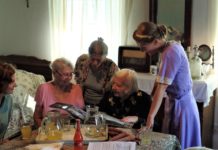With the Final Conference held in two Croatian cities, Varaždin on September 10 and Zagreb on September 15, 2025, the last program activity of the project MHE-ROMA, HISTORICAL MEMORY OF EUROPEAN ROMA officially came to a close. The Croatian Romani Union “KALI SARA” (SRRH “KALI SARA”) participated as a partner, alongside Roma Onlus and La Isola che c’è from Italy and the coordinating organization Nakeramos from Spain.
The conference brought together more than 70 guests, including Member of Parliament Veljko Kajtazi, presidents and representatives of Roma Minority Councils at municipal, city, and county levels, representatives of Roma and non-Roma associations, project participants, and other invitees.
Following the opening address, the project was presented by Suzana Krčmar, President of the SRRH “KALI SARA”. In her speech, Krčmar highlighted the role of Roma organizations and individuals, with particular emphasis the role of SRRH “KALI SARA” and its activities in fostering a culture of remembrance. She also underlined the project’s goals and explained why the organization had chosen to participate as a partner. The suffering of Roma during the Second World War – Samudaripen, remains one of the most tragic chapters in Roma history, Krčmar said. Despite its historical importance, this part of the past often remains insufficiently acknowledged and almost invisible in public discourse. Particularly concerning is the fact that Samudaripen is rarely taught to younger generations of Roma, or to majority society. In school textbooks, Roma suffering is usually categorized under ‘other victims,’ while Jews and Serbs are explicitly named as recognized targeted victims of the Nazi and Ustasha regimes. Krčmar stressed the urgent need to highlight historical facts and create a space for dialogue about Samudaripen. Fostering a culture of remembrance, she added, not only contributes to preserving the truth and dignity of victims but also plays an essential role in building the national identity of the Roma people. Systematically remembering this history is crucial to understanding the present and creating a more just society in which tragedies of such magnitude can never happen again. Krčmar expressed her gratitude to the European Commission for funding this important project under the CERV – Citizens, Equality, Rights, and Values program, as well as to the Government of Croatia’s Office for NGOs and the Office for Human Rights and the Rights of National Minorities.
In my presentation, I reflected on the MHE-ROMA project as a whole, on the memorial sites we visited in Rome and Barcelona and their historical context, with a special emphasis on the final visit to Croatia and participation in the commemoration of the International Roma Genocide Remembrance Day / Samudaripen on August 2. The Jasenovac Memorial Site, with Uštica as a part of the camp complex established exclusively for Roma, was the only authentic site of the former Ustaša concentration camp that the project participants had the opportunity to see and experience. In addition, in the park behind the Roma Memorial Center, there is the only monument in the world dedicated to the only Romani woman awarded the title “Righteous Among the Nations”, Hajrija Imeri Mihaljić. I especially emphasized how the printing of materials during the project, publications on social media, and the use of the Romani language in parts of the play “Najsen bistarde / Not Forgotten“ contributed to the project’s affirmation, both in the public space and within the Roma community itself. At the end of my presentation, I spoke about the methods and objectives of the project and announced that the organization plans to continue with performances of the national theater play in community centers in Roma settlements across Croatia, where members of Roma councils themselves would take on the role of hosts and co-organizers.
In Varaždin, Anesa Šabani, and in Zagreb, Ardijan Gaši, delivered a lecture on the role and status of the Romani language (Romani ćhib). They addressed the linguistic and historical context of the language, changes that occurred due to migrations from India to Asia, Europe, and other continents, and its role within Roma families, in culture and the arts, and in institutions, including its presence in the Croatian school curriculum. They also highlighted the recognition of November 5 as World Day of the Romani Language, an initiative launched by SRRH “KALI SARA” in cooperation with the member of Parliament Veljko Kajtazi. This milestone, achieved in 2012, made the Croatian Parliament the first in the world to proclaim the date as the national day of the Roma community in Croatia. Gaši explained how, through further work with the Ministry of Culture and Media and the Croatian Commission for UNESCO, SRRH “KALI SARA” succeeded in having the Romani language recognized by UNESCO in 2015 as intangible world heritage. Šabani placed special emphasis on the role of young Roma in preserving the language and proudly underlined that the MHE-ROMA project dedicated significant attention to its preservation and development, including the National Petition as part of the program.
Talita Jašarevski, project participant and actress in the play, spoke about the challenges, innovations, and new knowledge the project brought to young people. She illustrated her presentation with a short video documenting the group’s stay in Rome and Barcelona, their joint rehearsals, the experience of national performances, and the joint international premiere in Zagreb on August 1, 2025.
Before the audience discussion, Zvonko Novosel, leader of the theatre workshops and director of the national performance “Najsen bistarde / You Are Not Forgotten”, took the stage. He reflected on the creative process of preparing the play, the research into the lives and destinies of protagonists Johann Wilhelm Trollmann Rukeli, Ceija Stojka, and Hajrija Imeri Mihaljić, which he carried out with participants, as well as the audience’s reactions and the role of art in bringing historical truths closer to the public.
A particularly moving moment of the Conference was the screening of a joint video, prepared in English and Romani, summarizing the entire project. The audience watched in silence, with many moved to tears.
Judging by the atmosphere, the MHE-ROMA Final Conference had a profound impact on participants, the Roma community, and the broader public. It provided a platform for raising awareness of the Roma genocide, which remains underrepresented in education and public discourse. By presenting the project’s activities, workshops, and creative outputs, the conference strengthened the culture of remembrance and emphasized the importance of preserving historical memory.
For Roma youth, the conference was especially empowering, allowing them to revisit their experiences during workshops, international exchanges, and theatre performances. Many participants stated that their involvement inspired them to continue taking on activist and leadership roles in their communities, an essential step for ensuring the long-term sustainability of the project’s results.
Equally encouraging was the interest expressed by Roma Minority Councils and community representatives, who stressed their readiness to act as co-organizers of future cultural and educational activities together with SRRH “KALI SARA”. This participatory approach ensures that the project’s influence will continue well beyond its formal conclusion, fostering ongoing engagement, dialogue, and cultural valorization both within Roma communities and in wider society.












